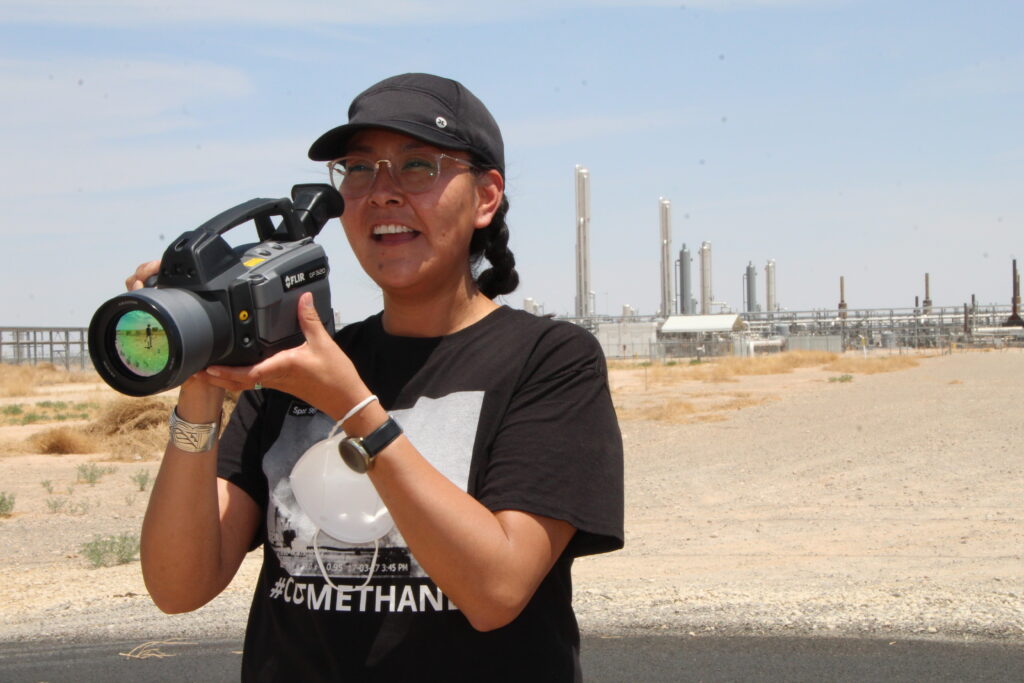Testimony delivered for public comment hearing on proposed rules to reduce oil and gas methane by the U.S. Environmental Protection Agency, January, 2023.

Hello, my name is Kendra Pinto. I live in the Eastern Agency of the Navajo Nation, within what is known as the San Juan Basin.
I have lived here for a majority of my life and have seen the Greater Chaco landscape change before my eyes. Because I live in a Frontlines Community, I experience the worst, known health impacts first. The increase of fracking in my area has grown exponentially in the past decade due to use of “advanced technology,” a technology that should better serve to protect the people and not poison them. Within that time frame, the amount of toxic pollutants that are emitted from oil and gas sites has increased but the amount of oversight and enforcement by regulatory agencies has not matched the same slope.
In an effort to remain active in my homelands, I took it upon myself to become a community organizer and seek information about oil and gas activities. I have given Congressional testimonies and I’ve also commented to the EPA several years ago on methane. I also became certified as an optical gas imaging thermographer in July 2021. Several trips into the San Juan Basin with the infrared camera literally shows the lack of enforcement in an area housing over 20,000 wells, not the news you want to hear with a 21% staff vacancy within the New Mexico Environmental Dept. It is highly doubtful the collective of over 40,000 wells in the state undergoes annual inspections with its current count of two staff members for petroleum storage tanks.
Because it is a rural and isolated area, the pervasive problems with oil and gas well sites will continue to emit hazardous, toxic pollutants and not be given the necessary priority, a historic problem for the Chaco region. Malfunctioning flares have been found by Earthworks’ thermographers in NM and will likely be found in our future fieldwork. Reporting these malfunctioning flares to the state doesn’t always guarantee action is taken, not something I want to hear as someone who has explored the open lands for over thirty years. With the increase in fracking and the use of freshwater, several large pools of produced water have been constructed in the community, a risk that the community should not bear when there are no immediate medical services available. No hospital, no fire station, no police station. It’s as bad as it sounds, folks rarely get basic services meanwhile the oil industry gets catered to.
An example I can leave you with is in September 2021 using the FLIR camera, an underground emissions event was found on-site, recorded, and reported via the 24 hour emergency line that is listed on the New Mexico Environmental Departments website. Quite a strange dilemma. For a week, no action was taken. It wasn’t until a staff member with NMED forwarded my complaint to the operator. Even then it took a couple of attempts to get the problem noticed and solved. Eventually the site was shut in, excavated, and the operator replaced a pipe that had a .08” pinhole. There was no way to know how long the so-called leak was happening. I’ve returned to the site since and have filed several other complaints.
This type of example is not uncommon for an area that receives little attention from Regulatory Agencies which may be in part because of the checkerboard issue, a problem that affects locals on a daily basis. The EPA must not waste any more time while frontline communities suffer the consequences of decisions that are usually made outside of the affected communities. Strengthening methane rules are a starting point in providing.
All with basic needs like clean air and clean water. EPA must accept credible evidence of pollution documented by community monitoring, complaints from within affected zones are necessary to determine a cleaner future and advance environmental justice. What better way than to listen to those impacted directly. Thank you for this time and I look forward to positive changes!
